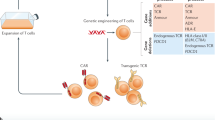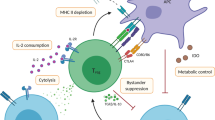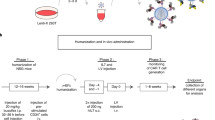Abstract
The application of gene therapy in autoimmune disease represents a novel use of this technology. The goal of gene therapy in the treatment of autoimmune disease is to restore ‘immune homeostasis’ by countering the pro-inflammatory effects of the CD4+ T cells in the lesions of autoimmunity. This can be accomplished by adoptive therapy with transduced T cells which can specifically home to the site of inflammation and secrete ‘regulatory’ protein(s) to ameliorate the inflammation or by direct targeting of the retroviral vector to activated T cells in the sites of inflammation. Transduction of autoantigen recognizing CD4+ T cells, to secrete anti-inflammatory products, may become the ‘magic bullet’ to combat the ravages of autoimmune inflammation and tissue destruction.
This is a preview of subscription content, access via your institution
Access options
Subscribe to this journal
Receive 12 print issues and online access
$259.00 per year
only $21.58 per issue
Buy this article
- Purchase on Springer Link
- Instant access to full article PDF
Prices may be subject to local taxes which are calculated during checkout
Similar content being viewed by others
References
Evans CH et al. Clinical trial to assess the safety, feasibility, and efficacy of transferring a potentially anti-arthritic cytokine gene to human joints with rheumatoid arthritis Hum Gene Ther 1996 7: 1261–1280
Linington C et al. Induction of persistently demyelinated lesions in the rat following the repeated adoptive transfer of encephalitogenic T cells and demyelinating antibody J Neuroimmunol 1992 40: 219–224
Kakimoto K et al. Isolation of T cell line capable of protecting mice against collagen-induced arthritis J Immunol 1988 140: 78–83
Almawi WY, Tamim H, Azar ST . Clinical review 103: T helper type 1 and 2 cytokines mediate the onset and progression of type I (insulin-dependent) diabetes Clin Endocrinol Metab 1999 84: 1497–1502
Calabresi PA et al. Cytokine gene expression in cells derived from CSF of multiple sclerosis J Neuroimmunol 1998 89: 198–205
Skapenko A et al. Altered memory T cell differentiation in patients with early rheumatoid arthritis J Immunol 1999 163: 491–499
Liblau RS, Singer SM, McDevitt HO . Th1 and Th2 CD4+ T cells in the pathogenesis of organ-specific autoimmune diseases (see comments) Immunol Today 1995 16: 34–38
Khoury SJ, Hancock WW, Weiner HL . Oral tolerance to myelin basic protein and natural recovery from experimental autoimmune encephalomyelitis are associated with downregulation of inflammatory cytokines and differential upregulation of transforming growth factor beta, interleukin 4, and prostaglandin E expression in the brain J Exp Med 1992 176: 1355–1364
Begolka WS et al. Differential expression of inflammatory cytokines parallels progression of central nervous system pathology in two clinically distinct models of multiple sclerosis J Immunol 1998 161: 4437–4446
Mauri C et al. Relationship between Th1/Th2 cytokine patterns and the arthritogenic response in collagen-induced arthritis Eur J Immunol 1996 26: 1511–1518
Ouyang W et al. Inhibition of Th1 development mediated by GATA-3 through an IL-4-independent mechanism Immunity 1998 9: 745–755
Swain SL . Generation and in vivo persistence of polarized Th1 and Th2 memory cells Immunity 1994 1: 543–552
Bradley LM, Yoshimoto K, Swain SL . The cytokines Il-4, IFN-gamma and IL-12 regulate the development of subsets of memory effector helper T cells in vitro J Immunol 1995 155: 1713–1724
Brocke S et al. Treatment of experimental encephalomyelitis with a peptide analogue of myelin basic protein Nature 1996 379: 343–346
Chen Y et al. Regulatory T cell clones induced by oral tolerance: suppression of autoimmune encephalomyelitis Science 1994 265: 1237–1240
Bergerot I et al. Active suppression of diabetes after oral administration of insulin is determined by antigen dosage Ann NY Acad Sci 1996 778: 362–367
Nagler-Anderson C et al. Suppression of type II collagen-induced arthritis by intragastric administration of soluble type II collagen Proc Natl Acad Sci USA 1986 83: 7443–7446
Thompson HS, Staines NA . Gastric administration of type II collagen delays the onset and severity of collagen-induced arthritis in rats Clin Exp Immunol 1986 64: 581–586
Wang ZY et al. Suppression of experimental autoimmune myasthenia gravis and experimental allergic encephalomyelitis by oral administration of acetylcholine receptor and myelin basic protein: double tolerance J Neuroimmunol 1995 63: 79–86
Hafler DA et al. Oral administration of myelin induces antigen-specific TGF-beta 1 secreting T cells in patients with multiple sclerosis Ann NY Acad Sci 1997 835: 120–131
Trentham DE et al. Effects of oral administration of type II collagen on rheumatoid arthritis (see comments) Science 1993 261: 1727–1730
McKown KM et al. Lack of efficacy of oral bovine type II collagen added to existing therapy in rheumatoid arthritis Arth Rheum 1999 42: 1204–1208
Bonini C et al. HSV-TK gene transfer into donor lymphocytes for control of allogeneic graft-versus-leukemia (see comments) Science 1997 276: 1719–1724
Anderson WF, McGarrity GJ, Moen RC . Report to the NIH Recombinant DNA Advisory Committee on murine replication-competent retrovirus (RCR) assays (February 17, 1993) Hum Gene Ther 1993 4: 311–321
Powell SK et al. In vitro analysis of transformation potential associated with retroviral vector insertions Hum Gene Ther 1999 10: 2123–2132
Mathisen PM et al. Treatment of experimental autoimmune encephalomyelitis with genetically modified memory T cells J Exp Med 1997 186: 159–164
Shaw MK et al. Local delivery of interleukin 4 by retrovirus-transduced T lymphocytes ameliorates experimental autoimmune encephalomyelitis J Exp Med 1997 185: 1711–1714
Kuchroo VK et al. B7-1 and B7-2 costimulatory molecules activate differentially the Th1/Th2 developmental pathways: application to autoimmune disease therapy Cell 1995 80: 707–718
Chen LZ et al. Gene therapy in allergic encephalomyelitis using myelin basic protein-specific T cells engineered to express latent transforming growth factor-beta1 Proc Natl Acad Sci USA 1998 95: 12516–12521
Moritani M et al. Prevention of adoptively transferred diabetes in nonobese diabetes with IL-10-transduced islet-specific Th1 lymphocytes J Clin Invest 1996 98: 1851–1859
Moritani M et al. Transgenic expression of IL-10 in pancreatic islet A cells accelerates autoimmune insulitis and diabetes in non-obese diabetic mice Int Immunol 1994 6: 1927–1936
Wogensen L, Lee MS, Sarvetnick N . Production of interleukin 10 by islet cells accelerates immune-mediated destruction of beta cells in nonobese diabetic mice J Exp Med 1994 179: 1379–1384
Costa G et al. Targeting rare populations of murine antigen-specific T lymphocytes by retroviral transduction for potential application in gene therapy for autoimmune disease J Immunol (submitted)
Fleugel A et al. Gene transfer into CD4+ T lymphocytes: green fluorescent protein-engineered, encephalitogenic T cells illuminate brain autoimmune responses Nature Med 1999 5: 843–847
Kashara N, Dozy AM, Kan YW . Tissue-specific targeting of retroviral vectors through ligand-receptor interactions (see comments) Science 1994 266: 1373–1376
Author information
Authors and Affiliations
Rights and permissions
About this article
Cite this article
Seroogy, C., Fathman, C. The application of gene therapy in autoimmune diseases. Gene Ther 7, 9–13 (2000). https://doi.org/10.1038/sj.gt.3301111
Published:
Issue Date:
DOI: https://doi.org/10.1038/sj.gt.3301111
Keywords
This article is cited by
-
The relative merits of therapies being developed to tackle inappropriate (‘self’-directed) complement activation
Autoimmunity Highlights (2016)
-
Cell-based gene therapy experiments in murine experimental autoimmune encephalomyelitis
Gene Therapy (2005)
-
Localized expression of an anti-TNF single-chain antibody prevents development of collagen-induced arthritis
Gene Therapy (2003)



